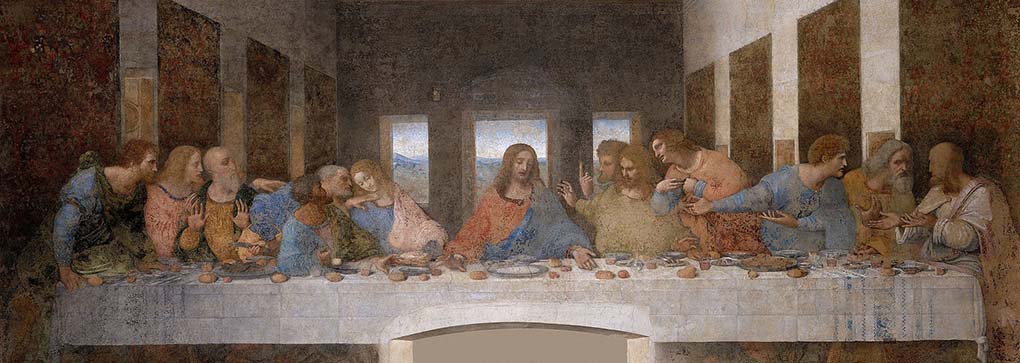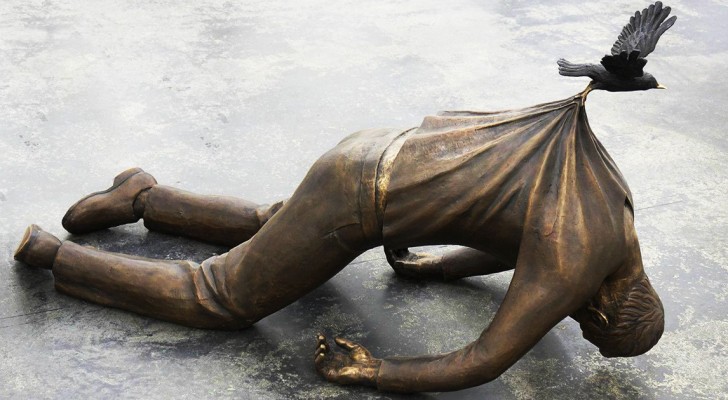In 1495 Leonardo da Vinci received an important request from the Duke of Milan. The Duke wanted Leonardo to create a fresco of the Lord’s Last Supper in the refectory of the Convent of Santa Maria delle Grazie in Milan, Italy. We are fascinated with Leonardo da Vinci due to the fame and mystery surrounding his work and life. But for those who actually got to know and work with him, Leonardo was probably not an easy man to deal with. He left behind only a handful of paintings – some terribly damaged or incomplete. He was easily distracted, losing interest, switching from one project to another, and constantly experimenting with new ideas and methods. The same was the case with the Last Supper. First, da Vinci experimented with applying the paint to a dry plaster so he could retouch it after the paint dries. Bad idea and the reason why almost nothing was preserved from the original work. Then, he decided that, unlike other artists who depicted Christ and disciples serene and untroubled during the Last Supper, he was going to underline the tension in the room and the emotional reactions of the apostles to Christ’s announcement that he would be betrayed by one of them. But he had a greater challenge – he could not find a model with an evil enough face to represent Judas. Months and years passed but the work was still not complete. Eventually, the prior of the church ran out of patience and complained to the Duke that the work was taking too long. Leonardo had to explain to the prior the importance of finding the right model for Judas and concluded that if he would not be able or allowed to do so he could “always use the head of the impatient prior”.
Everything we treasure and cherish about human life requires patience. In today’s Gospel reading the church is inviting us to look into and examine the importance and impact of patience on our lives. The parable in Matthew, chapter thirteen, tells us about a man who sowed wheat in his fields. His enemy at night plants weeds in the fields which are not only aggressive and dangerous to wheat, but also impossible to distinguish by the looks alone. So, the man’s servants come to him and suggest to go and gather the weeds from the fields. It is completely rational and reasonable that we are instinctively inclined to act, say and do things when we confront danger or are about to be harmed. But instead, the master of the fields decides to do something very unusual – to wait and be patient until the weed grows along with the wheat he planted. Grown weed is easily distinguished and dealt with without causing any damage to wheat.
Patience is a life quality and virtue that is often overlooked and underestimated in our post-modern society. We often value and encourage a life centered on influence, impact and self-expression. All of these are good and noble when exercised reasonably and with responsibility. But when action, reaction and self-expression become the center of our lives, when they are transformed into a basic human instinct, when we demote and remove prayer, patience and reflection from our everyday decision-making process – something dangerous and alarming starts emerging. Without patience being an active ingredient of everything we do and say, rather than acting, we start reacting to the events and challenges of our lives. In a life without everyday strive and thirst for patience we miss on true opportunities, we don’t notice and appreciate the beauty and blessings around us, we stumble and make mistakes, we expose ourselves to regret and grief and make it impossible for us to live a life of peace and joy we are called and invited to experience.
From the earliest times the Christian Church realized that in the same way that our bodies rely on nutrition, our spiritual health requires a very certain and specific set of principles and values. Among many the church identified and highlighted seven core virtues and spiritual disciplines necessary for our spiritual well-being. Patience is one of these seven core and essential virtues.
The healing waters of patience flow inside us in two directions – outwards and inwards. Patience for everyone and everything around us and patience with ourselves. Once we learn to be patient with ourselves, our mistakes and faults, we gain a better understanding and closure why we are acting and reacting in certain ways in certain situations. Patience creates a fertile ground for inner-growth and helps us transform our weaknesses into strength. Therefore, the Christian outlook towards patience nurtures a true sense of self-worth and self-esteem. As stronger and more authentic individuals who are able to recognize and transform pain and fault into possibility and growth, we are more sensitive to the pain around us, more inclined to be compassionate, loving and become a healing presence for those around us. As Christians we are called to heal the world, build the kingdom of God in a fractured and fragile world through prayer, love and compassion. None of these is possible without patience. Most importantly, patience creates an opportunity, time and space for us to slow down and pause, to bring our thoughts, feelings and questions to God before we ever express or act on them. Patience can indeed become the path through which Christ enters and touches our lives.


